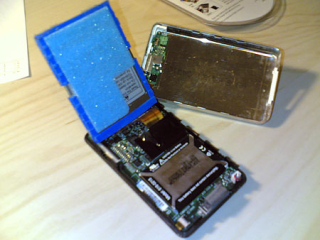 Loading...
Loading...
 Loading...
Loading...

Japanese authorities opened investigations after a recharging iPod sparked flares earlier this year. According to a government official the incident happened in the prefecture Kanagawa near Tokyo. Even though no one got hurt this marked only the latest in a series of battery problems in the past few years.
Apple was having a tough time with weak battery life before, but up until now their music players always managed to remain free from any bigger security issues. This new report does nevertheless add fuel to the fire of customer complains about Apple's refusal to give customers the chance to exchange iPod batteries on their own. For even though theoretically possible it remains yet practically unfeasible to undergo any such attempts without risking permanent damage to either the iPod's interior or exterior. Loss of warranty implied.
There were however unconfirmed reports about damaged or even exploding iPods before. For example in April 2007 when an Australian Nano user allegedly saw his iPod explode and blown off the table while it was in the process of being loaded.
A few months later the US news channel WSB-TV published pictures of another damaged iPod Nano which according to it's owner "spit out shoulder-high flames". Although credibility doubts still occurred when said user managed to get through the firework without any signs of burning injuries at all.
Yet the few cases in which some crashing iPod incidents did leak out into public was enough to spark concerns that certain iPods do indeed suffer from overheating. Thus in order to find out more about the underlying issues, Japanese officials now asked Apple to initiate an investigation on their own and report the results directly back to their department of Commerce and Economy for further decisions.
The player which ended up in flames was said to be an iPod Nano from an old 05/06 series. About 420000 samples of the affected device with model number MA099J/A were being delivered in total.
When news about a similar incident with damaged laptop batteries came to light in 2006, several vendors were forced to substitute or withdraw millions of them. Whether or not Apple has to take similar means and whether or not other Apple i-products get into the "line of fire" remains yet to be seen.